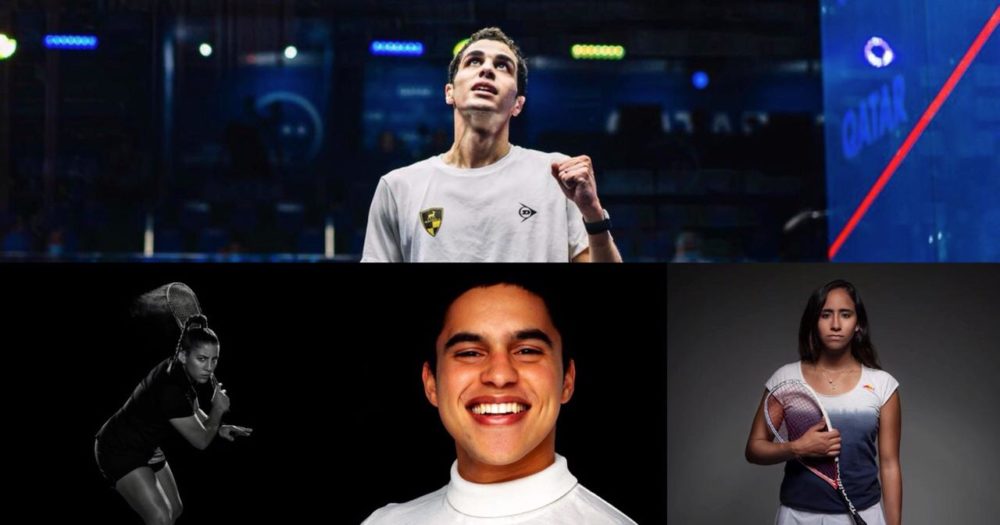An analysis published in 2019 by the British Journal of Sports Medicine showed that the “prevalence of mental health symptoms and disorders in current athletes” was 34% for anxiety or depression. For former athletes, that number was 26%. But how often do viewers take that into consideration when watching their favorite players ardently march towards victory? Probably not so often. SportsMENTA’s first virtual conference brought together world-renowned Egyptian athletes dominating the world of squash to inspire and openly discuss the mental fitness challenges we all face while chasing successful careers and new heights.
Mental health advocate and CEO and founder of EMPWR magazine, Ally Salama, brought together squash professionals; the world no. 1 Ali Farag, world no. 2 Nouran Gohar, and former world no. 24 Kanzy El Defrawy. In a free-to-enter panel discussion, they shared their views and insights on the significance of mental health throughout their careers.
We bring you three key takeaways from the event, which we believe everyone can gain something from.
1. Seeing Mental Health from An Athlete’s Perspective
When asked about what mental fitness meant to them, each athlete reflected on the triumphs and lessons that shaped their perception of mental health in pursuing highly-rewarding but stressful careers.
While mental health is a crucial aspect of an athlete’s performance, Kanzy El Defrawy asserted that there still is a stigma surrounding it.

Kanzy El Defrawy – Photo via Wikipedia
“Due to the lack of awareness on this matter, athletes end up tackling their mental issues in silence, which doesn’t always prove successful and makes them unaware of the magnitude of these issues.” – Kanzy El Defrawy, Former World No. 24 Squash Player.
El Defrawy received psychological support during her first US championship back in 2014, and the experience made her feel that the Middle East still has quite some room for development on this critical subject.
Farag agreed. He also shed light on how regional sports associations only portray professional athletes when they’re well-composed, and that’s not what they actually experience prior to and after matches. “This contradiction adds to the pressure inflicted on these athletes and only shows a handful of them — those who reach a professional level — while the narratives of others remain untold,” Farag elaborated.
Because of this unrealistic portrayal, in Farag’s opinion, vulnerable athletes are always advised to deal with their problems alone and to “toughen up”; which goes to affect their character and career, and negatively, their confidence.
As someone who never received psychological support, world no.2 squash player Nouran Gohar said that she fortified her mental health through trial and error, and that pushed her to maintain her discipline and passion throughout her career.
2. Mental health from one generation to another: What could be done better?
Seeking to normalize the conversation about mental health in Egyptian households and communities, Salama urged the panelists to reflect on the relationship between their parents and their mental health.

Ali Farag wins the 2018 Qatar Classic Championship – Photo via beIN Sports
Parents should reinforce that sports build characters; not becoming number one. Becoming number one is a byproduct of the sport.” – Ali Farag, Current World No.1 Squash Player.
Seeking to implement this concept within both current and upcoming athletes, Farag noted that budding players should be allowed to do mistakes and trust the learning process that comes with it. El Defrawy agreed and stated that parental pressure only deflates the player’s ability to excel and that parental involvement should be limited for the athlete to vocalize his own self-perception. Gohar added that this stigma-filled culture doesn’t allow athletes to express how they feel; especially with their parents. She also stressed the cruciality of this factor for athletes to overcome external pressure and expectations of them.
3. Covid-19: A refresh button for athletes
In Covid-19 times, how did the mental wellbeing of these veterans change as they were forced to take time off the court?

Nouran Gohar wins the 2019 US Open Squash Championships in Philadelphia – Photo via PSA World Tour
“It was a really good time to reset and evaluate how far you’ve come in such a fast-paced sport. We were like machines; we were dehumanized for the last couple years.” – Nouran Gohar, Current World No. 2 Squash Player.
As each athlete recalled their pandemic-struck career, we noticed one unanimous response from all three panelists: appreciating the little things.
For Gohar, she initially enjoyed spending more time with her loved ones. However, after a while, she still felt a gap in everyday accomplishments. Throughout the lockdown, Gohar learned how to have non-squash-related successes in her daily regimen. “Hadn’t it been for the pandemic, we wouldn’t have let ourselves take the time off”; she said.
Farag advised younger generations and those of his own to not let the sport determine their worth or happiness. “You can learn how to have a different perspective on life aside from winning or losing; I learned that during Covid.”; he said.
“We couldn’t do what we used to do every day and that taught us how to appreciate the things we sometimes take for granted”; El Defrawy added.
We’re excited to see SportsMENTAcon‘s future endeavors and its potential to vocalize mental health on a bigger scale for both athletes and Egyptian households.




























